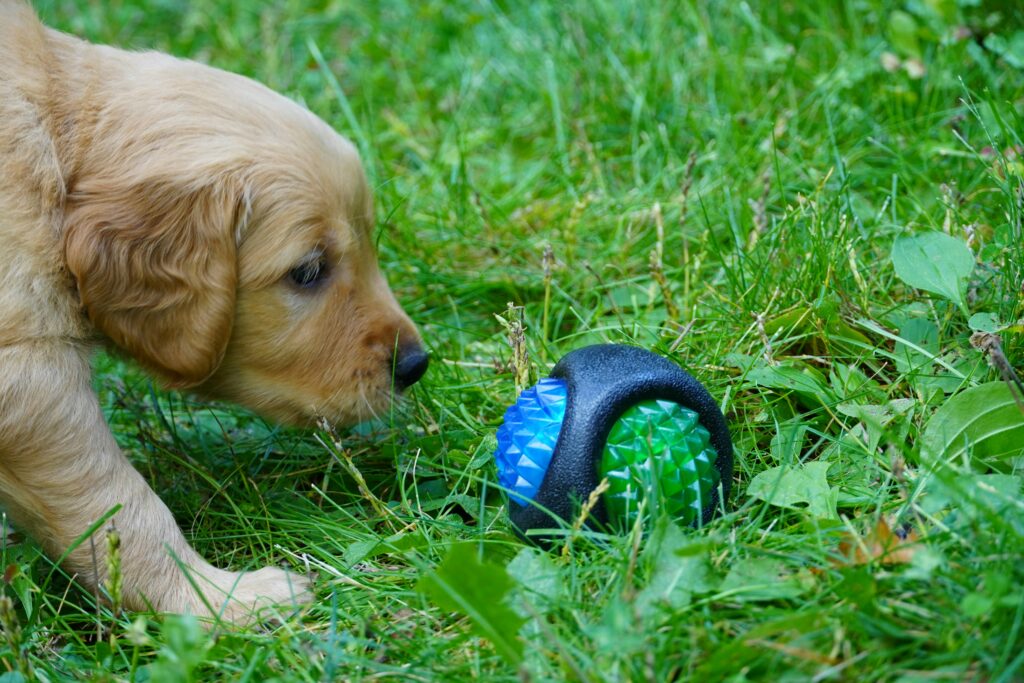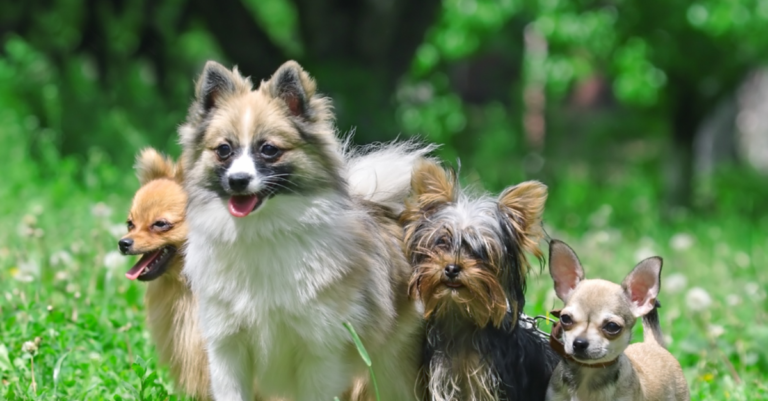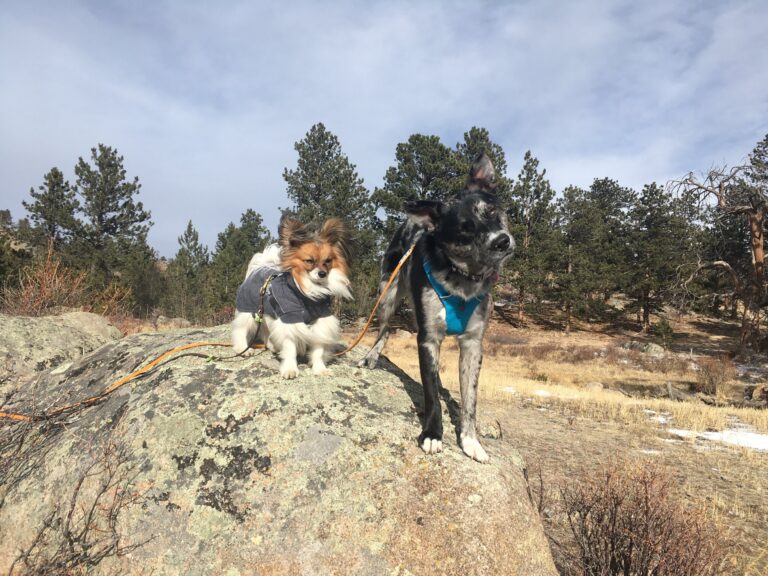Prepare to unlock the keys to successful training for your pint-sized pooch. In this comprehensive guide, we delve into the unique world of small breed puppies and the specific training tactics that set the foundation for a lifetime of good behavior. Get ready to discover the importance of early training, as well as practical tips and tricks tailored specifically for your little companion’s developmental needs.

Training your small breed puppy can seem like a daunting task, but it doesn’t have to be. With the right approach, you can instill good habits and manners from the very beginning, ensuring a happy, healthy, and well-behaved dog for years to come. Whether you’re a first-time dog owner or an experienced pet parent, this guide provides valuable insights and strategies to make your training journey smoother and more rewarding.
So, if you’ve recently welcomed a small breed puppy into your home, or if you’re planning to do so soon, this guide is a must-read. 🐶💕 From housebreaking tips to socialization strategies, we’ve got you covered. Uncover the secrets to effective pint-sized pooch prep, and set your furry friend up for a lifetime of success. Stay tuned for a comprehensive guide that’s sure to make your small breed puppy training journey a walk in the park.
Adapting Training to Small Size and Fragility
Training small breed puppies requires an awareness of their physical fragility. Because of their delicate bones and joints, overly rough play or harsh training techniques can cause injury. Their size makes them more susceptible to unintentional harm during training sessions, especially when they’re handled too roughly or allowed to jump from high surfaces. For this reason, gentle handling and low-impact exercises are essential components of any training plan.
When designing a training routine, pet owners should consider using ramps or steps to help small dogs reach beds or couches instead of encouraging jumping. Training them to use these aids from an early age reduces stress on their joints and prevents injury. Additionally, using a harness instead of a collar for leash training is especially important for small breeds, as their tracheas can be easily damaged by pulling pressure.
It’s also worth noting that because of their compact frames, small breed puppies can become tired more quickly than larger breeds when overworked. While they have bursts of energy, they also require frequent rest. Training sessions should be kept short, fun, and interspersed with breaks to avoid overwhelming them.
Creating a Safe and Stimulating Environment
The home environment plays a crucial role in shaping the behavior of small breed puppies. Creating a safe, enriching space is an important first step toward successful training. Puppies are naturally curious and will explore every corner of their environment. For small breeds, this often includes spaces that might be out of reach for larger dogs. It’s vital to puppy-proof the home by securing wires, blocking access to small spaces, and keeping harmful objects out of reach.
Small puppies can easily become overstimulated, especially in environments with loud noises, excessive activity, or too many people. While socialization is important, gradually exposing your puppy to different sights, sounds, and smells will help prevent them from becoming fearful or anxious. Over time, this careful exposure can help build resilience, boost confidence, and prepare them for various scenarios they may encounter in the real world.
Stimulating toys, rotating objects for exploration, and interactive puzzles are particularly useful for engaging a small breed puppy’s sharp mind. These enrichment tools provide entertainment, encourage focus, and help reduce destructive behaviors caused by boredom. A mentally stimulated puppy is often more relaxed and responsive to training.
Tailoring Nutrition and Feeding Practices
Feeding small breed puppies correctly also contributes to successful training outcomes. Because they have faster metabolisms, they require more frequent meals than larger breeds, particularly in the early stages of life. Hypoglycemia, or low blood sugar, is a common concern for very small breeds. This condition can lead to weakness, tremors, or even seizures, making it essential to provide regular, balanced meals.
Training is often most effective when positive reinforcement includes high-value treats. For small dogs, this must be done with care. Treats should be tiny and healthy, so as not to upset their nutritional balance or contribute to obesity. Excessive weight gain can lead to joint problems and reduce their energy levels, which can affect the success of their training sessions.
Choosing a breed-appropriate, veterinarian-recommended puppy food helps support physical development and cognitive function. Some high-quality puppy foods are enriched with DHA and other nutrients that assist in brain development, supporting your training efforts from the inside out.
Socialization with People and Other Pets
Socialization is one of the most crucial aspects of raising a small breed puppy. However, it must be approached with careful planning to ensure the experience is both positive and productive. Small dogs can feel threatened by larger dogs or unfamiliar people, which can result in defensive behaviors such as barking, snapping, or hiding.

Starting with calm, controlled interactions helps ease your puppy into social settings. Invite trusted friends and family members to your home to meet your puppy one at a time. Observe their body language closely and provide praise and treats when they interact calmly or confidently. This helps associate new people with positive outcomes.
Introducing your puppy to other animals should also be done slowly. If you have other dogs, cats, or even birds in the home, give your new puppy space and time to adjust. Supervise all interactions and intervene if either animal seems stressed or aggressive. Puppy playdates with similarly sized and tempered dogs can be a great way to build social skills in a safe environment.
Enrolling your puppy in a reputable puppy kindergarten or training class can be highly beneficial. These structured environments are designed to foster socialization while also reinforcing obedience skills. Instructors can help guide positive play and redirect problematic behavior before it becomes ingrained.
Teaching Communication and Body Language Awareness
An important yet often overlooked part of training small breed puppies is learning how to read their body language. Because they are so small, their signs of stress, fear, or excitement may be subtle and easily missed. Pet owners who become attuned to these cues are better able to provide appropriate responses and guidance.
Signs of stress in a small puppy may include licking the lips, turning the head away, yawning, or tucking the tail. If these signals are noticed, it’s a good idea to stop or modify the current activity. Ignoring these cues can lead to fear-based behaviors or shutdown responses. Likewise, signs of contentment such as wagging tails, relaxed ears, and playful bows indicate that the puppy is feeling safe and is more likely to absorb training lessons.
Training small breed puppies to communicate their needs is also important. Teaching commands such as “sit,” “wait,” and “gentle” can help manage interactions with people and other animals, while providing the puppy with a way to feel secure and understood. Incorporating hand signals alongside verbal commands can be particularly useful for small dogs, as it gives them a visual cue to rely on even in noisy environments.
Managing Barking and Vocalization
Small dogs are often known for being vocal. While barking is a natural form of communication, excessive or inappropriate barking can become a behavioral issue if not addressed early on. Understanding the causes behind your puppy’s barking is key to reducing it.
Small breed puppies often bark out of fear, excitement, or frustration. They may bark when left alone, when a stranger approaches, or when they see something unusual. To manage barking effectively, it’s important to address the underlying cause, rather than just attempting to silence the behavior.
Training methods such as desensitization and counterconditioning can help reduce fear-based barking. For instance, if your puppy barks at strangers, you can work to gradually expose them to new people while offering treats and praise for remaining calm. Teaching a “quiet” command using positive reinforcement also gives your dog an alternate behavior to perform instead of barking.
Avoid yelling or using punishment to stop barking, as this can increase anxiety and worsen the behavior. Instead, remain calm, redirect their attention, and consistently reward quiet behavior.
Encouraging Independence and Preventing Separation Issues
Small breed puppies often form very strong bonds with their owners, which can be both a blessing and a challenge. This intense attachment sometimes leads to separation anxiety, a condition where a dog becomes stressed when left alone. Symptoms may include whining, barking, pacing, and even destructive behaviors.
Training for independence should begin early. Create a safe space, such as a cozy crate or puppy playpen, where your puppy can feel comfortable and relaxed on their own. Practice leaving the room for short periods and gradually increase the time apart. Always return calmly, without making a fuss, to help normalize departures and arrivals.
Providing enrichment toys, like treat-dispensing puzzles or safe chew toys, helps occupy your puppy’s time while you’re away. Playing calming music or leaving a piece of clothing with your scent can also ease their anxiety. If separation issues persist, it may be helpful to consult a professional trainer or behaviorist who specializes in anxiety management.
Smart Start Training: A Specialized Approach for Small Breed Puppies
Smart Start Training is a specialized approach designed to address the unique needs of small breed puppies. It focuses on early socialization, obedience training, and addressing potential behavioral issues before they become major problems.
Early Socialization
Smart Start Training emphasizes the importance of early socialization for small breed puppies. Exposure to different environments, people, and other animals at a young age can significantly reduce fear-related behaviors and increase the puppy’s confidence.
- Introduce your puppy to various environments: indoor, outdoor, noisy, quiet, etc.
- Expose your puppy to people of different ages, sizes, and ethnicities.
- Let your puppy interact with other animals, particularly other dogs.
Obedience Training
Obedience training is another critical aspect of Smart Start Training. This not only teaches your puppy to follow commands but also helps to establish a strong bond between you and your pet.
- Start with basic commands like ‘sit’, ‘stay’, ‘come’, etc.
- Always use positive reinforcement to reward good behavior.
- Be consistent with your commands and training sessions.
Addressing Potential Behavioral Issues
One of the main benefits of Smart Start Training is its focus on preemptively addressing potential behavioral issues.
Managing Energy Levels
Since small breed puppies have high energy levels, it’s important to provide them with plenty of exercise and mental stimulation. This can help manage their energy and prevent behavioral problems related to hyperactivity.
- Regular walks and playtime can help burn off excess energy.
- Puzzle toys and training sessions provide mental stimulation.
Preventing Small Dog Syndrome
Preventing Small Dog Syndrome involves teaching your puppy that they can be confident and secure without resorting to aggressive or fear-based behaviors.
- Ensure your puppy doesn’t feel threatened or scared in their environment.
- Avoid reinforcing negative behaviors by coddling or comforting your puppy when they exhibit fear-based behaviors.
Setting Your Puppy Up For Success
While Smart Start Training for small breed puppies requires time and patience, the rewards are substantial. By understanding their unique needs and providing targeted training, you can set your small breed puppy up for a lifetime of good behavior.
Remember, consistency is key in training. With dedication, patience, and love, your pint-sized pooch will grow into a confident and well-behaved dog. After all, good behavior is not the result of size, but the outcome of smart, consistent, and compassionate training.
Conclusion
In conclusion, “Pint-Sized Pooch Prep: Smart Start Training for Small Breed Puppies” provides invaluable advice for new pet owners. This guide’s emphasis on foundational training is key for ensuring that small breed puppies grow into well-behaved and social adult dogs. By starting early and being consistent, owners can effectively curb bad behavior and cultivate good habits. It is noteworthy that these training methods are not one-size-fits-all, but rather tailored specifically for smaller breeds, considering their unique needs and characteristics.
Moreover, the guide goes beyond mere obedience training, including aspects of health, nutrition, and overall well-being, thereby offering a holistic approach to puppy care. It reinforces that the goal isn’t just to train, but to create a lasting bond between owner and pet.
Incorporating keywords such as “puppy training”, “small breed dogs”, and “pet care” ensures visibility in search engines, and the use of transitional phrases enhances readability. The guide is not just an informational resource, but a guide to responsible pet ownership. This is a comprehensive guide that is sure to be beneficial for all new puppy owners, setting them up for a lifetime of companionship with their pint-sized pooches. 🐾🐶



